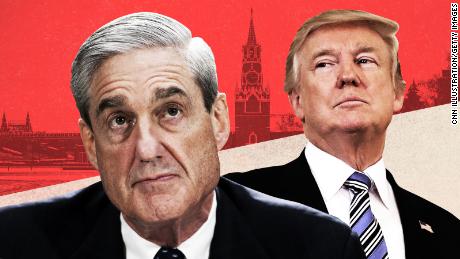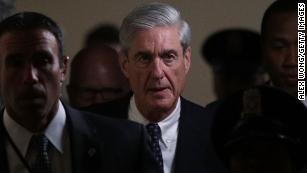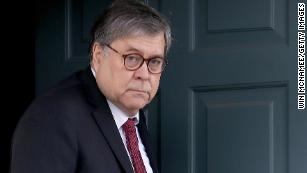11 looming questions now that Mueller's investigation is over
Special counsel Robert Mueller has finished his investigation into Russian meddling in the 2016 presidential election and turned over his final report to Attorney General William Barr.
In a letter to lawmakers Friday afternoon, Barr said he might be ready to share Mueller's "principal conclusions" with Congress "as soon as this weekend," and a Justice Department official said that information may be made public. But it's unclear how much of Mueller's full work the public will see -- or when it will be released.
Here are the looming questions:
Was there a conspiracy to collude?
In the court of public opinion, this is the ball game. Prosecutors crafted a mosaic of how collusion could have played out. But if Mueller stops short of producing a smoking gun, President Donald Trump is sure to declare all-out victory and claim total vindication.
Of course, the reality is more nuanced. Court filings and news reports have already established that senior Trump associates were eager to accept assistance from, or share sensitive election data with, the Russians. It's the second half of the equation that is still shrouded in mystery.
Special counsel Robert Mueller ends investigation
Mueller's team has left a trail of breadcrumbs suggesting that if there was collusion with the Russians, then Trump's campaign chairman Paul Manafort may have played a key role. Trump and Manafort deny any collusion, and in dozens of public filings, Mueller never produced any evidence implicating them in collusion. But prosecutors repeatedly alleged that Manafort worked for free, was desperate for cash, and tried to monetize his position with influential oligarchs.
In addition, Mueller laid out how Trump acolyte Roger Stone sought information from WikiLeaks with prodding from Trump's campaign, as to when the website would release politically damaging documents. Those documents were stolen by Russian government hackers. But Mueller never accused Stone of directly working in cahoots with WikiLeaks or the Russians.
Trump's ex-attorney Michael Cohen recently testified on Capitol Hill that he witnessed Stone and Trump discussing WikiLeaks in summer 2016. During a gripping daylong hearing, Cohen also described how he and Trump pursued a massive business deal with a Russian company during the campaign. Mueller's team has suggested that this could be a motive for collusion, outlining in court filings how the deal would have enriched Trump with Russian help.
If there was collusion, and it rose to the level of criminality, it's safe to assume that Mueller would have brought indictments. The Russia investigation is now over, and nobody in Trump's orbit was charged with conspiring with the Russian government. A Justice Department official told CNN on Friday that no additional indictments are coming from the Mueller investigation.
But Mueller could have also found things resembling collusion that aren't prosecutable. Federal rules require Mueller to provide the attorney general with a report explaining why he did not bring charges against people who were under investigation. It's up to Barr to decide how much should become public, but hopefully the report gives a definitive answer to the question of collusion.
Why didn't Mueller interview Trump in person?
Another element of the unfolding Russia drama was the on-again, off-again dance between Mueller's team and Trump's lawyers regarding the President's testimony. Trump provided Mueller with written responses about his 2016 campaign, but nothing that happened after Election Day, viewing the transition and his time in office as subject to executive privilege.
With the investigation over, it appears that Trump's lawyers succeeded in staving off an in-person interview.
Trump's lawyers knew their client regularly strays from the truth and sometimes flat-out lies. So, preventing an interview was tantamount to preventing perjury.
Mueller could have subpoenaed Trump, though this would have carried risks of its own, like a lengthy court battle ending with a ruling in Trump's favor. Mueller might have found ways to get what he needed from other witnesses. Or perhaps he was ultimately swayed by Trump's lawyers that they cooperated so extensively that a sit-down interview wouldn't add much value.
If Mueller was deterred by the Justice Department from seeking a subpoena, a notification must go to Congress. Special counsel regulations require the attorney general to inform Congress if any prosecutorial steps were prevented from going forward. That is something to look for.
What will the public see of Mueller's report?
During his confirmation hearing in January, Barr pledged to "provide as much transparency as I can" when it comes to the Russia investigation. His comments satisfied Republicans, who control the Senate and confirmed him with ease to lead the Justice Department.
But Barr left plenty of wiggle room in his testimony, and there isn't anything in the special counsel regulations that requires Barr to release the full report to the public. Democrats have drawn a line in the sand, demanding more promises from Barr and total transparency.
There is no indication that Barr is in the mood to cave to Democratic complaints. But his hands could be tied if Democrats subpoena the report or invite Mueller for a public hearing. A potential lawsuit by House Democrats could trigger lengthy court battles around the report. California Rep. Adam Schiff, chairman of the House Intelligence Committee, recently said all these options are on the table. In this respect, the "end" is only the beginning.
Were there even more contacts with Russians?
After the election, Trump's team maintained that there were zero contacts between the campaign and Russians. It didn't take long for this story to completely fall apart. Since then, at least 16 Trump associates have been identified as having contacts with Russians during the campaign or transition. There were dozens and dozens of Trump-Russia contacts.
That list of 16 includes senior people from Trump's campaign, senior Trump administration officials, members of Trump's family, and people who were part of Trump's trusted inner circle.
Stunningly, we're still learning about some of these contacts. It was only a few weeks ago when we learned that Manafort shared internal campaign polls with one of his Russian associates, Konstantin Kilimnik, who is suspected by the FBI of having active ties to Russian intelligence.
The lie of "no contacts" was debunked a long time ago. Perhaps there are even more contacts between Trump-world and Russia that will be revealed for the first time in Mueller's report.
Did Trump or anyone else obstruct justice?
The saying goes, "the cover-up is worse than the crime." That could be true once more.
Obstruction can be a lot of things. Already, members of Trump's inner circle pleaded guilty to witness tampering, lying to the FBI and misleading congressional investigators. Cohen pleaded guilty to lying to Congress and testified to lawmakers that he did so at Trump's direction, though Trump didn't explicitly use those words. Prosecutors say these actions by Cohen and former Trump campaign aides impeded the Russia investigation time and time again.
Many of Trump's detractors already think he is guilty of obstruction. They point to his firing of FBI Director James Comey, his role in misleading the public about the June 2016 Trump Tower meeting, attempts to remove Mueller from his post, relentless public attacks against witnesses, and more.
Whether this meets the legal threshold of obstruction is up to Mueller. But even then, Justice Department rules say a sitting president cannot be indicted. And unlike independent counsel Ken Starr's investigation of President Bill Clinton in the 1990s, it isn't Mueller's job to tee up impeachment in Congress.
House Democrats, however, are ready to pick up where Mueller leaves off. The Democratic chair of the House Judiciary Committee said recently he believes it's already "very clear" that Trump obstructed justice.
Are there more big lies that will be exposed?
Lies are a major theme of this two-year saga. Time after time, Trump and his allies have changed their stories, spread false information or been forced to disavow past comments. Six Trump associates have been accused by Mueller's team of lying about their Russian ties.
Regardless of the legal implications, Mueller might have uncovered more lies as he interviewed dozens of witnesses. And it's possible some of those revelations could be in his final report.
Read: Attorney General William Barr's letter to judiciary committee leaders about the Mueller report
For instance, even some of the most stalwart Trump supporters have cast doubt on Donald Trump Jr.'s testimony that he never told his father about the June 2016 Trump Tower meeting. And Cohen publicly testified that he witnessed a June 2016 conversation between Trump and Trump Jr. that he believes was about the Trump Tower meeting.
Others found it hard to believe that Trump campaign aide George Papadopoulos didn't tell anyone on the campaign that he was tipped off about the Russians having damaging Hillary Clinton emails. (Papadopoulos has told CNN he "can't guarantee" that it never came up.)
Then there was the controversial move by Trump campaign staff to block language in the Republican party platform at their 2016 convention about arming Ukraine to counter Russia. At the time, Manafort and Trump denied any involvement, despite Manafort's extensive ties to Ukrainian interests. Since then, Mueller asked witness about this situation, and reportedly wanted to ask Trump about it too.
Was Trump deemed a counterintelligence threat?
Beyond the criminal probe, investigators at the FBI looked into the possibility that Trump was working for the Russians. Details of this investigation were publicly confirmed this week by former FBI Deputy Director Andrew McCabe, who opened the investigation in May 2017.
McCabe said in interviews that the counterintelligence investigation was spurred by Trump's bizarre public statements and comments -- not some damning classified information. But once the probe was opened, the FBI could use a wide array of tools to investigate the President.
The FBI general counsel at the time, James Baker, told Congress it was not a clear-cut suspicion. He said FBI officials considered the whole range of possibilities, from Trump "acting at the behest of and somehow following directions, somehow executing their will" to the possibility of Trump being totally innocent. Either way, Baker said, it needed to be investigated.
Still, analysts have noted that it would be strange for investigators to deem Trump a national security threat, but then sit on that information for months while Mueller continued his work.
Republicans have been extremely critical of McCabe and regularly accuse the FBI and Justice Department of anti-Trump bias. The report could thoroughly explain why McCabe and others took this drastic step and describe the safeguards that were in place to ensure a fair investigation.
How much of the dossier could Mueller confirm?
It's impossible to discuss the Russia probe without bringing up "the dossier," the infamous memos written in 2016 by retired British spy Christopher Steele. The reports, which he said contained raw intelligence from trusted sources, alleged a widespread conspiracy of collusion.
The most salacious elements of the dossier are unproven, yet many of the allegations contained in the memos have held up over time, or at least proven partially true. The memos accurately described Russia meddling and said Trump's campaign was hiding contacts with Russians and that the Kremlin was involved in potential real estate deals for the Trump Organization.
Mueller's team met with Steele in summer 2017, and CNN previously reported on efforts by the FBI to assess the intelligence memos. But it's unclear whether Mueller felt compelled to include a full accounting of the dossier in his final report. A lot of that work likely came from highly classified sources and clandestine surveillance that US intelligence agencies want to keep secret.
What did Mueller find when he crossed Trump's "red line?"
Trump famously declared in a July 2017 interview with The New York Times that Mueller would be crossing a "red line" if he investigated Trump's personal finances and his family's business.
Mueller blew past Trump's rhetorical line. He scrutinized potential efforts by Trump's son-in-law Jared Kushner to mix his business interests with his government role. And he handed off the wide-ranging Cohen investigation to federal prosecutors in Manhattan. That case put the Trump Organization squarely in the crosshairs of federal investigators.
That is some of what we know. We also know that Mueller never indicted any members of Trump's family -- the closest he got to Trump's innermost circle was Cohen. But there might be things we don't know.
It would not have been difficult for Mueller to obtain Trump's tax returns from the Internal Revenue Service. Trump has worked hard to keep his taxes out of public view -- perhaps Mueller's report will change that. If not, the onus will fall on eager House Democrats.
Will Mueller knock down left-wing conspiracies?
A cottage industry of left-wing conspiracy theorists blossomed in the Mueller Era.
Anti-Trump conspiracy sites started popping up in 2017, rivaling right-wing counterparts like Infowars. Academics with little to no insight into the Mueller investigation have breathlessly posted Trump-Russia theories, creating viral Twitter threads that were barely tethered to reality.
On a few occasions, these uninformed influencers spread word of Trump's imminent arrest, explosive surveillance wiretaps, or that dozens of new indictments were approved against Trump's family. Obviously, none of it was true.
Mueller is required to explain why he brought charges against some people and why he didn't prosecute others. He doesn't need to delve into these dark corners of the Internet. But if he doesn't knock down any of these conspiracies, they'll continue bouncing around forever.
How many related investigations are still active?
Mueller's work gave birth to an entire ecosystem of related investigations. Some of those investigations are over, others are underway, and others might still be unknown to the public.
Prosecutors in Manhattan picked up the mantle on the Cohen case, and he's heading to prison this spring for a three-year stint. Prosecutors there are also weighing charges in a foreign lobbying probe against Manafort associate Greg Craig, who once served as White House counsel under President Barack Obama.
Michael Flynn, Trump's short-lived national security adviser, cut a deal with Mueller and provided evidence against one of his former lobbying partners. Bijan Kian was charged with illegally lobbying for Turkey and is set to go on trial this summer. He pleaded not guilty.
Other key players -- like Manafort's longtime deputy Rick Gates and influential DC lobbyist Sam Patten -- have been cooperating with Mueller for a while. Gates was a senior official on Trump's inaugural committee, which is now under scrutiny by federal investigators in Manhattan.
The same US attorney's office in Manhattan is separately seeking to talk to executives from the Trump Organization, though the reason for those interviews has yet to be disclosed.
Prosecutors say Gates, Patten, Cohen and Flynn have been helpful beyond the special counsel investigations. But redactions have kept the details secret. Mueller's team worked closely with prosecutors who will remain at the Justice Department and can continue pursuing these cases.
Additionally, Mueller has aggressively pursued evidence from an unnamed company that is owned by a foreign country. The battle over that subpoena has gone all the way to the Supreme Court. Now that the investigation is over, will they continue fighting? And what does it mean that Mueller was able to wrap up without getting any evidence from this mystery company?
Mueller's investigation was never just about Russia. There was an entire component that looked at how Middle East countries potentially tried to improperly influence Trump's team, perhaps through emissaries like Blackwater founder Erik Prince. Mueller didn't bring any charges from that swath of the probe, though parts could have been handed off to other investigators.
News Courtesy: www.newagebd.net













